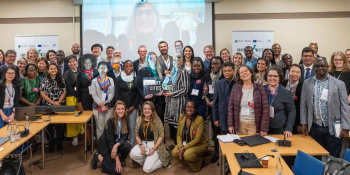
Housing at the heart of urban climate action
Highlights from the Intergovernmental Panel on Climate Change (IPCC) Special Report on Climate Change and Cities Workshop
Cities across the Global South are on the frontline of climate impacts, yet the needs and voices of communities in informal settlements are often overlooked in climate research, policy responses, and financing. This gap was a central theme at the recent IPCC (Intergovernmental Panel on Climate Change) Special Report on Climate Change and Cities (SRCities) workshop, held on the sidelines of the Africa Ministerial Conference on the Environment (AMCEN).
Held at the UN-Habitat headquarters in Nairobi on 17–18 July, the workshop marked the first step in developing the IPCC’s first-ever report focused exclusively on cities — a milestone for elevating urban issues in global climate dialogue.
Making the invisible visible
Habitat for Humanity’s delegation; Grace Ananda (Africa Policy and Advocacy Manager) and Rebecca Ochong (Director Government Relations and International Advocacy, HQ) – brought forward a key message: housing must be central to climate adaptation planning.
Drawing from our growing body of evidence, they presented three case studies from recent reports:
- Slum Blind: Climate Migration and Informal Settlements
- Net-Zero Homes: Circular Solutions to the Housing Crisis
- Climate Adaptation Through Housing in Informal Settlements
Each showed how housing intersects with climate resilience; from secure land tenure and community governance to circular construction and inclusive financing.
Rebecca’s session, “Net-Zero Homes and Adaptation Pathways through Housing,” spotlighted innovative models that link circular economy principles with locally adapted shelter solutions. Grace’s presentation, “Slum Blind: Climate Migration and Housing,” challenged the invisibility of displaced populations in mainstream climate frameworks, calling for deeper attention to informal settlements and internal climate migrants.
Their contributions fed into a broader set of reflections that surfaced throughout the workshop. Participants from organizations such as the Global Covenant of Mayors, World Resources Institute, UN-Habitat, SDI, Government of Kenya, research institutions echoed the call to ground climate solutions in lived realities; emphasizing the importance of co-creating knowledge with communities rather than treating them as passive recipients. Practitioner insights, grey literature, and diverse forms of urban experience, particularly from historically underrepresented regions, were recognized as essential to shaping meaningful, inclusive climate responses.
One compelling insight came from discussions on Ukraine’s post-conflict urban recovery. UN-Habitat shared how they are supporting municipalities like Borodianka Hromada to map war-related damage and guide rebuilding efforts that go beyond physical infrastructure. A central focus has been aligning recovery with long-term climate goals, including energy-efficient housing and net-zero development. The upcoming hybrid conference “Rebuilding a Place to Call Home” in October 2024 will bring together local leaders, international partners, and practitioners to explore how housing can anchor both recovery and resilience. The Ukraine example underscored that even in the most fragile contexts, housing is not only a humanitarian need — it is a strategic entry point for sustainable urban transformation.
In an interview with UN-Habitat’s communications team during the event, Rebecca emphasized the urgent need to mainstream housing in climate policy and increase climate finance for informal settlements. These perspectives and the lived examples they were grounded on, resonated strongly with participants, including IPCC leadership and fellow urban researchers.
Carrying the conversation forward
Beyond the plenary sessions, we engaged in bilateral meetings with the Global Covenant of Mayors, the Kenya Government’s BCRUP (Building Climate Resilience for the Urban Poor under the UCLGA) representative, and the World Resources Institute, exploring alignment around COP30 and collaboration for the Africa Climate Summit which will be held in Addis Ababa this September 2025.
Next, the IPCC authors will develop a framework to collect case studies that will inform the 2027 SRCities report, the 2028 Global Stocktake, and guide the development of new adaptation indicators and methodologies in 2029. These milestones offer a critical opportunity to ensure that housing, land, and informal settlements are not peripheral, but central, to how climate resilience is defined and financed.
As urbanization accelerates and climate risks grow, our mission is clear: to ensure that the people most affected by these transitions are not excluded from the solutions. We’ll continue to champion housing as a frontline climate intervention, and advocate for a future where cities are not only resilient, but just.